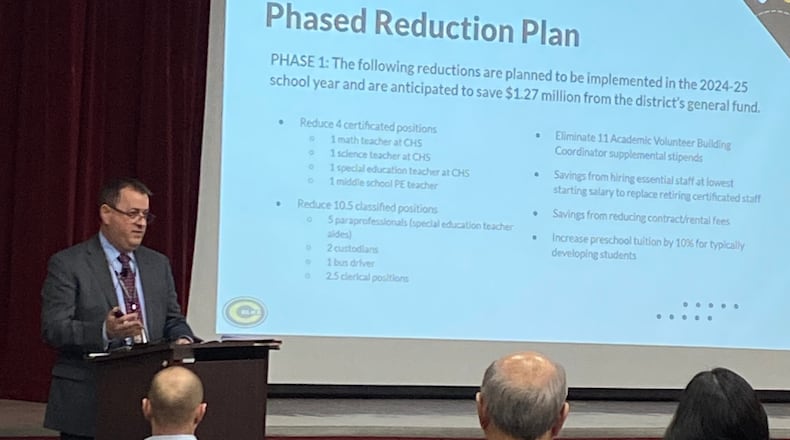The March levy, if approved, would cost a homeowner $136.50 for each $100,000 of appraised value, according to the Montgomery County auditor’s office.
In November, voters rejected a 5.9-mill levy that would have generated about $12.9 million per year.
About 77% of Centerville schools’ revenue comes from voted levies. With property values going up, the school district will get more tax revenue, but taxes do not rise nearly the same percentage as values do, because of a 1970s Ohio law.
Sauber said the district will receive about $3.4 million in additional property tax money when the value changes are fully phased in. She said that does not cover rapidly rising expenses.
Several members of the audience said it was almost impossible to continue to pay for the many tax levies of recent years affecting Centerville and Washington Twp., including police, fire, library and school levies.
Other members of the audience suggested other ways to cut, including slashing administrative staff and looking at benefits for staff, like health insurance funding. District officials said many of those ideas would not work.
Wesney said Centerville has one of the lowest ratios of administrators to students in the state. Health insurance premiums and compensation are governed by union contracts. Wesney said the Centerville teachers’ contract expires in June and is up for renegotiation.
Some at the meeting said school employee pay is high. Paul Szewczyk of Centerville spoke against the levy and said he thought too much of the money raised would go to teachers’ compensation rather than addressing the upgrades to facilities the schools need.
“The levy does nothing to address the deterioration of our school buildings and the growing list and the safety of our children,” he said.
John Doll, a Centerville school board member, said some of the benefits to staff, like contributions to the State Teachers’ Retirement System, which funds educators’ retirement in Ohio, are mandated by state law.
“We don’t have a whole lot of options, and we can cut and cut and cut, but you can’t cut to the point where you don’t have any teachers or people here to do what we have to do for the kids,” Doll said. “And history has told us for over the last 30 years, the state’s not going to help us.”
Maha Kashani, a Centerville parent, said she’s learned a lot about school funding in the last year and was pleased by how much information the district put out. She argued that Centerville can’t cut administration any further.
“We don’t want to race to be the highest student-administrator ratio in the whole state of Ohio,” she said. “We’re already getting so much value from the administration.”
The cuts that will happen next school year are expected to save the district $1.27 million. Those cuts include four teaching positions (one each from high school math, science and special education, plus a middle school physical education teacher), plus reductions in support staff (five special education teachers’ aides, two custodians, one bus driver and 2.5 clerical positions).
The district also plans to hire new essential staff at the lowest starting salary possible when replacing retiring staff, and will increase preschool tuition by 10% for typically developing students.
Wesney said the district expects to make staff cuts through retirements and resignations, not layoffs.
“We tried to think outside the box, looking at not just positions but other ways to save money through various service contracts, increasing fees, etc.,” Wesney said.
If the March levy does not pass, the district expects to make $1.62 million in additional cuts in the 2024-2025 school year. That would include 10.75 “certified” position cuts (three high school teachers, two middle school gym teachers, five elementary school teachers and 0.75 of a school counselor position). They would also cut five special education teacher aides and 11 clerical positions.
Wesney said the second round of cuts could include layoffs.
In Round 2, the district also would increase school fees for preschool through eighth grade students by $5 to $15. They would increase pay-to-play participate fees by 20%, building use fees by 10% and athletic field rentals by 25%. The district would also evaluate supplemental contracts (staff pay for co-curricular and extracurricular positions) for additional reductions.
About the Author


